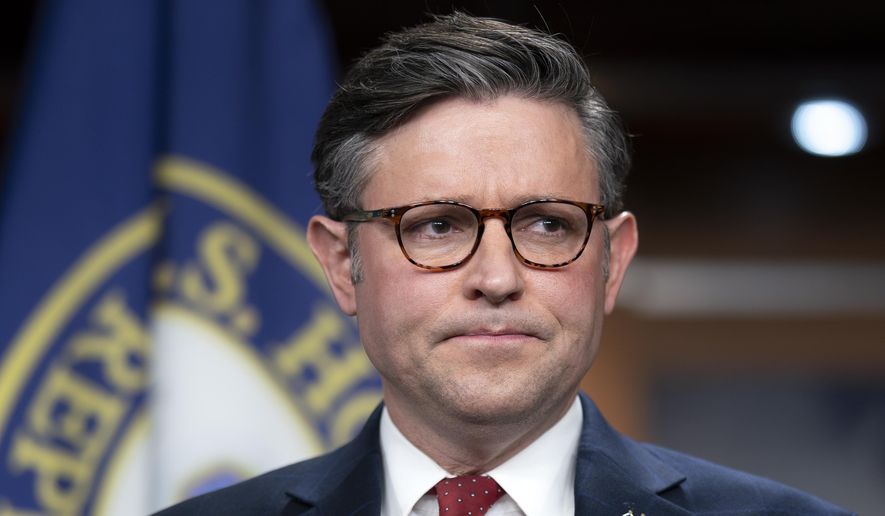The push to create a fiscal commission to force Congress to tackle the government’s unsustainable debt got a big boost with the elevation of new House Speaker Mike Johnson, but backers still aren’t sure they can rally the votes.
The idea behind a commission is to create bipartisan momentum for politically tough decisions about taxes and spending — exactly what Congress has avoided for the last 25 years.
Mr. Johnson, in taking the speaker’s gavel a month ago, said a commission needs to start work “immediately” to tackle the government’s $33.7 trillion in total debt.
Legislation has been introduced in both the House and Senate, with both Democrats and Republicans backing the idea. Each proposal calls for a 16-member panel, and if the commission can produce a consensus plan it would be guaranteed expedited action in Congress.
“You’re in a world right now, where you’re borrowing over $79,000 a second, every second. If you care about national security, you better start caring about this,” said Rep. David Schweikert, Arizona Republican. “If you care about Medicare, you better start caring about this. If you care about interest rates, you better start caring about this.”
Rep. Ralph Norman, South Carolina Republican and member of the House Budget Committee, said a commission will only be as good as the “willingness” of lawmakers to vote in favor of deep spending cuts. So far, discussions have been focused on how to enforce spending cuts.
“You just got to have the will to do it, and as of today, we didn’t have it,” Mr. Norman said. “We don’t have it.”
Mr. Johnson, while backing a commission, has said he doesn’t plan to take a heavy-handed approach.
“I believe it’s also an important principle that the speaker not predetermine the outcome of that, or dictate objectives or benchmarks,” he told reporters. “I think it needs to be an organic decision process that is made by very thoughtful people who have a passion about the issue and have expertise in the subject matter.”
Federal spending in fiscal year 2023 came to about 23% of gross domestic product, while revenue was just 16% of GDP. That 7-point gap resulted in a $1.7 trillion deficit.
Both figures were worse than the average over the last three decades when Uncle Sam collected about 17% of GDP in revenue and spent about 21%.
Over the coming decades, both numbers are expected to go higher, with revenue reaching 19% of GDP and spending hitting a whopping 29% of GDP by the middle of the century.
It’s that gap the commission must address.
The last time the government attempted a commission was in 2010 when it assigned an 18-member panel led by former White House Chief of Staff Erskine Bowles and former Sen. Alan Simpson to suggest reforms.
President Obama created the panel with the understanding that it would take a supermajority of 14 votes to approve a final deal. Given the evenly divided makeup of the panel, that would ensure significant bipartisanship.
In the end, just 11 members voted in favor of the final plan, which would have combined significant spending cuts with some new taxes.
The idea of a commission isn’t particularly popular on the left, where activists argue members will be too scared to recommend serious revenue increases and too eager to cut from the big programs like Social Security and Medicare.
The Center on Budget and Policy Priorities, a left-leaning think tank, said the commission would focus on narrow questions like balancing the bottom line, without getting at more fundamental matters such as what a government needs to do, “from addressing climate change to broadening opportunity and reducing hardship.”
“Ignoring these and other important issues could lead a commission to recommend policies that would reduce deficits but harm the country in important ways,” CBPP said.
Republicans want the commission to ease the path for spending cuts by making clear just how little room the government has to pay for its expansive promises.
“One of the reasons you often pick up opposition to the concept of a deficit commission is it’s going to expose there’s no more money,” Mr. Schweikert said. “Functionally, every dime a member of Congress votes on now is borrowed.”
By the end of the year, he said, the government will be paying $1 trillion in interest payments. That’s money that can’t be spent on other needs.
Conservative activists also have a list of extras they want a commission to address.
Adam Brandon, president of FreedomWorks, said a debt commission would have to tackle “major immigration reform.” A prominent issue is that there are millions of high-skilled jobs open in the country with no domestic workers qualified to fill them, he said.
Unless the education system in the country is revamped, more skilled workers from other countries will need to be brought, Mr. Brandon said.
“Would you rather bring in a lot more people, the Nigerian computer programmer, the Russian chemical scientist,” Mr. Brandon said. “Or would you rather pay a lot higher taxes for a declining population?”
• Alex Miller can be reached at amiller@washingtontimes.com.




Please read our comment policy before commenting.